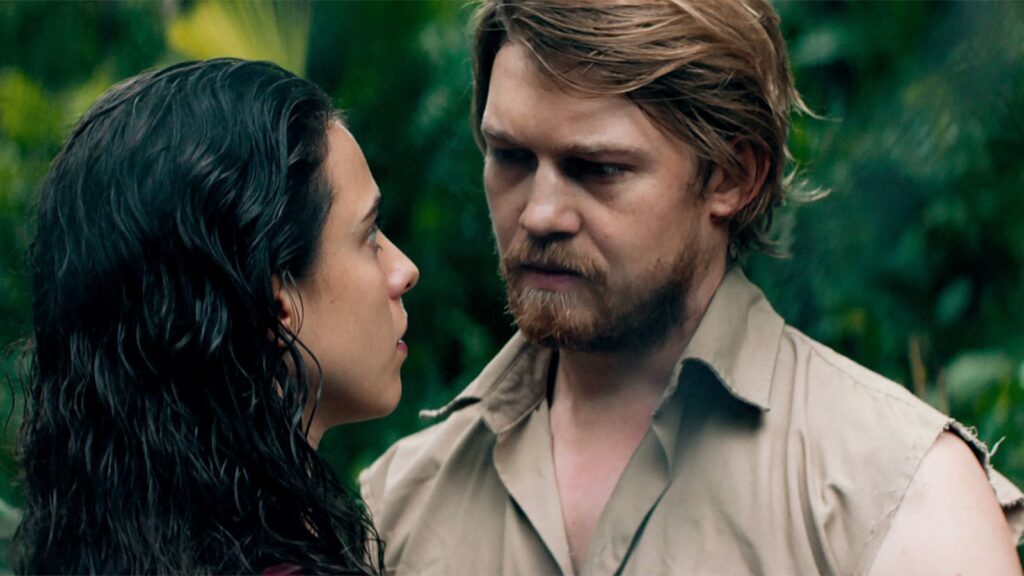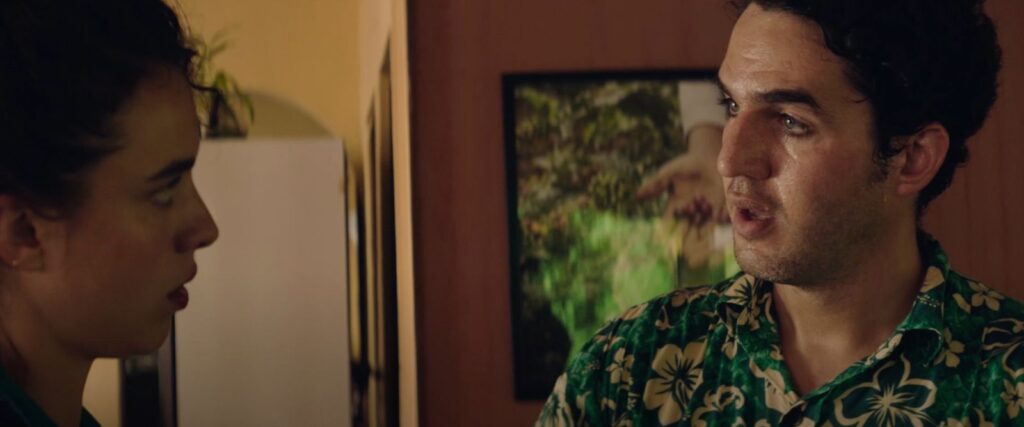By Alex McPherson
A sexy, hypnotic, and intelligent drama, director Claire Denis’ “Stars at Noon” shines brightly, if viewers can get on its unusual wavelength.
Adapted from Denis Johnson’s 1986 novel of the same name, which takes place during the Nicaraguan Revolution of 1984, “Stars at Noon” unfolds in present-day and centers around Trish (Margaret Qualley), a supposed hard-news American journalist stuck in a politically unstable, Covid-stricken Managua. Lacking funds and a passport, she’s practically at the end of her rope when we first meet her, constantly drunk and turning tricks for wealthy men (including the Minister of Tourism) at the bougie Inter-Continental Hotel to scrounge up the means necessary to leave Nicaragua for good.
While on the prowl for a new client and some precious American dollars, Trish bumps into Daniel (Joe Alwyn), an enigmatic smooth-talker from London who claims to work for an oil company and casually admits he “commits adultery often.” They are immediately attracted to each other, and their transactional love-making evolves into a much deeper attachment. This mysterious white man in a white suit is being pursued by shady government operatives, and Trish’s own life is put at risk. Against their better judgment, these two spiraling souls are pulled together by desperation, romantic longing, and stupidity. They make a last-ditch effort to flee into Costa Rica, pausing frequently for sex, and causing plenty of collateral damage along the way.

Indeed, “Stars at Noon” thrives on mood and tone above all else — tedium mixed with an alluring, dreamlike haziness, offset by jolts of violence and a persistent sense of eeriness. Denis keeps plot details fairly sparse, choosing instead to let viewers bask in the sticky, humid environment, and observe the characters grasping for an escape.
The point is that they’re out-of-place in a foreign land destructively trying to remove themselves. Pacing is slow, conversations stretch on for long periods, and notwithstanding the mounting danger our central duo finds themselves in during the bloated 2-hour-and-18-minute runtime, “Stars at Noon” refuses to stomp on the gas pedal. Despite this subdued pacing, the film is mostly engaging, with a career-best Qualley doing much of the heavy-lifting.
Trish is a wonderfully flawed protagonist, equal parts cynical and helpless, prone to frantic decision-making, which often ends in trouble. Qualley brings a jumpiness that emphasizes Trish’s brash, headstrong personality, but there’s also an ever-present sadness that lingers over her conversations with Daniel and locals, self-loathing that manifests itself in impulsiveness.
While Trish isn’t an easy character to latch onto emotionally, Qualley’s performance — along with Denis’ patient approach to narrative — helps her feel like a grounded (literally) presence throughout. Her understated expressiveness brings additional layers to Trish’s interactions. Trish is trying to claw her way out of a predicament, likely of her own making, joined by a suave “gentleman” she’s both using and being used by, unsure of the kind of person she wants to become and — as Daniel’s goals become slightly clearer — what kind of impact she wants to leave behind.
Éric Gautier’s camera follows her with a documentary-esque gaze, allowing us to observe her day-to-day efforts to leave Nicaragua, complete with strict Covid precautions. “Stars at Noon” thrives in tactile details, like the pitter-patter of rain against a windshield, and the warm glow of sunlight passing over naked bodies wrapped together in embrace. What’s sacrificed by this approach, however, is an immediacy that saps some of the intensity from pivotal sequences late in the film, as more traditionally “thrilling” elements come into play.
The soundtrack, by Tindersticks, brings a jazzy, noir-inflected touch to the proceedings, at once calming and uneasy — a dichotomy illustrated in Trish’s connection to Daniel. Sex scenes with Daniel are filmed with vivid eroticism — moments of togetherness that provide physical and emotional release while giving them both hope for a better tomorrow.
One incredible sequence on an empty dance floor, featuring a great song by Tindersticks, is irresistibly romantic, unfolding on a different plane of existence from the characters’ grim circumstances.
Qualley gets the most to work with, but Alwyn’s natural charisma and smooth line delivery helps make Daniel’s character a compelling question mark from beginning to end — mixing the profane with a cool, calm, and collected demeanor. It’s frustrating, though, that “Stars at Noon” leaves the specifics of his goals so ambiguous, rendering the film’s much more politically focused second half lacking the emotional impact it could have had.
It’s clear that Denis wants to illustrate the harmful effects of Western governments forcing themselves into outside countries, but the idea seems underdeveloped here. Trish doesn’t know why people want Daniel dead, hence we don’t know for sure either, only learning tidbits of information from Daniel and a creepy CIA agent (Benny Safdie). By the time we finally figure out what’s going on, the story nears its conclusion, leaving the narrative’s political bent neutered.
On the other hand, Trish and Daniel’s dash to the border does have subversive qualities, as their “love” for one another creates chaos for those they run into. Their heroism, as a result, becomes parasitic. For all the sweltering lovemaking and “adventure,” there’s a human toll, and Denis never lets us forget the pain left in their wake.
At the end of the day, “Stars at Noon” is an imperfect, yet strangely compelling watch, put together with a level of craft that’s easy to admire. Pacing and storytelling issues aside, the film only strengthens upon further reflection, as Denis once again demonstrates her mastery of the medium.

“Stars at Noon” is a 2022 romantic thriller directed by Claire Denis and starring Margaret Qualley, Joe Alwyn and Benny Safdie. It is rated R for sexual content, nudity, language and some violence, and runtime is 2 hours, 15 minutes. It was released in select theaters Oct. 14 and began streaming on Hulu on Oct. 28. Alex’s Grade: B+
Alex McPherson is an unabashed pop culture nerd and a member of the St. Louis Film Critics Association.

